NIGERIA is once again in the throes of a cholera outbreak, which has already claimed dozens of lives and left over a thousand people severely ill across various states. This recurrent crisis, caused by ingesting the Vibrio cholerae bacteria found in contaminated water and food, exposes severe systemic failures in providing safe water, sanitation, and hygiene to the population. As the rainy season intensifies, the Nigeria Centre for Disease Control and Prevention (NCDCP) has warned of an increasing trend in cholera cases. We are committed to outlining the necessary steps Nigeria must take to effectively manage and ultimately eradicate this deadly epidemic.
Cholera thrives in environments with poor hygiene and contaminated water sources. It spreads through the ingestion of water or food contaminated by the faeces of infected individuals. This contamination can occur at the source, during transportation, or through improper storage at home. Food can also become tainted by soiled hands during preparation or consumption. The symptoms of cholera, such as acute, profuse, painless watery diarrhea, can lead to severe dehydration and death if not treated promptly. This entirely preventable public health emergency is a stark reminder of the urgent need for systemic improvements in water, sanitation, and hygiene (WASH) across Nigeria.
The recent statistics are alarming. The NCDCP reported 113 cases and seven deaths from cholera within one week, spanning from June 17 to June 23. The affected states include Lagos, Ogun, and Katsina, with Lagos bearing the brunt with 104 cases. This situation is dire and demands immediate, comprehensive action to prevent the outbreak from escalating to the catastrophic levels seen in 2021, where over 100,000 suspected cases were reported, resulting in 3,604 deaths.
The foundation of preventing cholera lies in ensuring access to clean water and proper sanitation facilities. A recent UNICEF report states that only 68 percent of Nigerians have access to a basic water supply, with 19 percent safely using managed sanitation facilities, while 24 percent practice open defecation. The Nigerian government must prioritize the development and maintenance of robust WASH infrastructure. This includes investing in clean water sources, such as building and maintaining water treatment plants, drilling boreholes, and providing water purification systems. Constructing and maintaining adequate public and household sanitation facilities, such as toilets and sewage systems, will help reduce open defecation and the subsequent contamination of water sources.
A coordinated public health response is crucial in managing cholera outbreaks. The NCDCP has already initiated several response activities, including the distribution of medical supplies for case management, infection prevention , control, and laboratory support to medical centers nationwide. These efforts must be scaled up and sustained. Rapid response teams should be deployed to affected areas to provide immediate medical care, track and isolate cases, and conduct contact tracing to prevent further spread. Health facilities must be equipped with adequate supplies of oral rehydration salts, intravenous fluids, and antibiotics to treat cholera patients effectively.
Community engagement is vital in controlling cholera outbreaks. Local leaders, religious figures, and community health workers should be mobilized to disseminate accurate information about cholera prevention and control measures. Public health campaigns should focus on promoting safe water storage and treatment practices, encouraging the use of latrines, and emphasizing the importance of hygiene. By involving communities in the response efforts, we can ensure that interventions are culturally appropriate and widely accepted.
Addressing the root causes of cholera requires long-term, sustainable solutions. The Nigerian government must commit to improving the overall standard of living for its citizens by investing in infrastructure, healthcare, and education. This includes expanding access to clean water, sanitation, and hygiene facilities in both urban and rural areas. Furthermore, efforts should be made to strengthen the healthcare system by increasing funding, training healthcare professionals, and ensuring the availability of essential medicines and supplies.
By strengthening WASH infrastructure, ensuring a coordinated public health response, engaging communities, enhancing monitoring and surveillance, and implementing long-term solutions, Nigeria can effectively manage and eventually eradicate cholera. It is imperative that all stakeholders, including government agencies, healthcare professionals, community leaders, and international partners, work together to protect the health and well-being of Nigerians and prevent future outbreaks.


